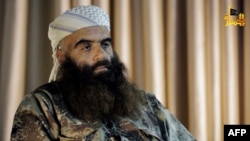The United States targeted a senior al-Qaida leader in an airstrike Sunday in northwestern Syria, the latest in a series of so-called “decapitation” strikes aimed at terrorist organizations.
Abu Firas al-Suri was described by Pentagon Press Secretary Peter Cook as a “Syrian national and a legacy al-Qaida member” who fought in Afghanistan and worked with al-Qaida founder Osama bin Laden.
Al-Suri was also said to be a senior member of al-Qaida’s Syria affiliate, Jabhat al Nusra, serving as the group’s spokesman.
Cook said al-Suri was attending a high-level meeting at the time of the strike. He said several enemy combatants were killed but that defense officials were still trying to determine if al-Suri was one of them.
The Syrian Observatory for Human Rights, which has been tracking the fighting in Syria, said earlier that al-Suri, along with his son, were killed in an airstrike in a village northwest of the city Idlib.
Other leaders targeted
The U.S. has previously targeted Jabhat al Nusra and other al Qaida-linked groups in Syria, though most strikes have concentrated on the Islamic State terror group.
“We’ve been targeting al-Qaida leaders for some time, as you know and that has always been a legitimate target,” Cook told reporters at the Pentagon.
“Al Nusra has its ties to al-Qaida, and that is something that we’ve been very up front about for years and continues to be an ongoing active part of our efforts,” he said.
The Pentagon also confirmed Monday the death of another senior leader of an al-Qaida-linked group.
As first reported by VOA, al Shabab’s Hassan Ali Dhoore was killed in a U.S. drone strike in Somalia late Thursday.
Dhoore had led al Shabab’s Amniyat, the terror group’s elite assassination force.
U.S. defense officials said Dhoore had been behind attacks that led to the deaths of three , and that his death “would be a significant blow to al Shabab’s operational planning.”
Defending 'decapitation' strikes
So-called “decapitation” strikes – strikes targeting key leaders of terror groups – have at times been criticized for failing to stem the tide of violence and for sometimes making such groups even more radical. But the Pentagon defended the tactic Monday.
“We have seen success on the battlefield on the part of the local forces we’re supporting, both Iraqi and Syrian,” according to Cook.
“I don’t know how much you want to attribute to the fact that ISIL leadership has been undermined by our airstrikes but we certainly feel like that is making a difference,” he said.




